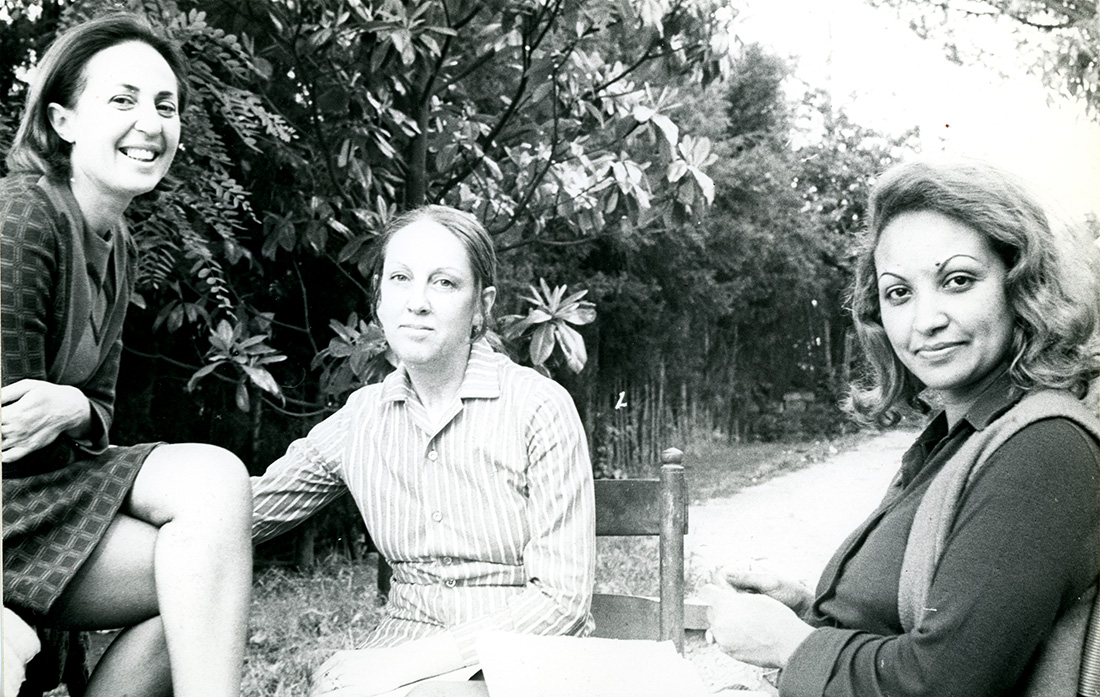Forum Lectures #27: Luisa Lorenza Corna & Frida Sandström
Critique of art, critique of the family. Reading Carla Lonzi now

In 1970, art critic and art historian Carla Lonzi abandoned art for separatist feminism. Together with the journalist Elvira Banotti and the artist Carla Accardi, she founded the first separatist, anti-authoritarian, and decentralized feminist group in Italy: Rivolta Femminile. Within Rivolta, Lonzi transformed her critique of art into a social critique of the post-fascist culture in which she lived and acted. Central to Rivolta’s activity was an editorial modelling of affinity groups all around Italy, which resulted in a myriad of texts within and against the current political order. Today, sexual, and reproductive rights are again at risk in Italy and internationally, while the remaining fragments of the bourgeois public sphere are at a tipping point between disintegration and neo-fascism. The proposal for this seminar is to undertake a social reading of Lonzi’s and Rivolta’s writings, which are currently discussed, republished, and translated internationally. How to translate Lonzi and Rivolta historically and politically?
This forum Lecture follows the polyphonous model of Rivolta Femminile and consists of two joint presentations:
Frida Sandström will make a reading of Lonzi’s critique of art and sexuality from the point of view of the ‘unexpected.’ Outlining the anti-fascist critiques of the family in Italy in the 1970s and today, she will discuss Lonzi and Rivolta’s writing practice as a critique of representation, in the history of philosophy as well as within the nation-state.
Luisa Lorenza Corna will analyse Lonzi’s controversial intervention on the legalization of abortion in 1978 alongside contemporary debate over technologically aided reproduction. Together, Luisa and Frida will discuss the necessity of social translation between contexts and concepts in times of crisis.
About Luisa Lorenza Corna
Luisa Lorenza Corna is a lecturer in Art and Visual Culture at UWE Bristol. Her writings have appeared in Parallax, Historical Materialism, Radical Philosophy, and Philosophy of Photography Journal. She is a regular contributor to the magazine Art Monthly. She is completing her first book, Fugitive Lives (2023), and editing a collection of texts by the Italian anarchist architect Giancarlo de Carlo. Her and Jamila Mascat’s translation of Carla Lonzi’s writings, Feminism in Revolt, has just been released by Seagull Books.
About Frida Sandström
Frida Sandström is a PhD fellow in Modern Culture at the Department of Arts and Cultural Studies at the University of Copenhagen. Sandström received a master’s degree in Aesthetics from Södertörn University in 2019 and has been published by Brill (2023), Afterall (2020), and Philosophy of Photography Journal (2019). Her art criticism and essays are published internationally. Sandström has been editor of Women, Art & Research since 2023, and a contributing editor at Paletten Art Journal since 2015. Sandström has taught critique, aesthetic philosophy and art history at the University of Copenhagen, Linnaeus University, Royal Academy of Copenhagen, Konstfack – University of Arts and Crafts and Umeå Academy of Fine Arts. In the fall of 2021, she was a visiting research student at CRMEP (Center for Research in Modern Philosophy), Kingston University, London. From December 2023 through November 2024, she is a Paris x Rome Fellow at La Bibliotheca Hertziana – Istituto Max Planck per la storia dell'arte, Rom, and at DFK Paris - Deutsches Forum für Kunstgeschichte, Paris.
Forum Lectures
Forum Lectures is a series of lectures by Danish and international thinkers and cultural workers reflecting on how art co-forms commonality. Forum Lectures bring thinking and shared study back to the university and invite public lectures on the last Tuesday of every month from 17:00 – 19:00.
The initiative is hosted by the research group of the New Carlsberg Foundation research centre Art as Forum. Our researchers are occupied by a.o. the infrastructures of the arts, collective modes of production, the entanglement of political theory and aesthetic theory, assembling curation strategies, dematerialized art, acts of strategic separatism and temporality in digital art.
The lecture is free and open to everyone interested.
Map of South Campus
View directions.
View on map of the Faculty of Humanities - South Campus.
View map of South Campus (pdf).
